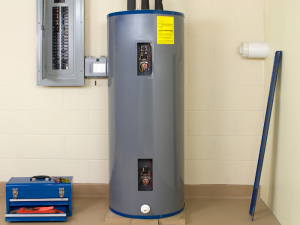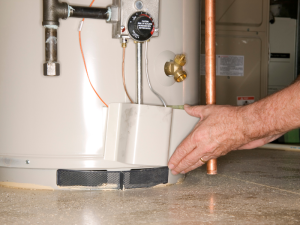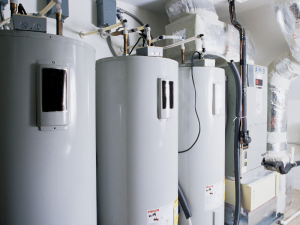Water heaters often see quite a lot of wear and tear throughout the months and years a homeowner has one. More often than not, people prefer to take a hot shower, especially after a long day out and they feel tired.
Hot water doesn’t have to only be limited to just showers and hot baths either. When it comes to cleaning up or even cooking, a bit of hot water makes a task so much easier. With how much people prefer to use hot water, a little wear and tear to your water heater is only natural.
One possible result of the slight damage is when you find a small puddle of water on or around your water heater. While this water can also be the sign of condensation forming on the outside of the tank, it can also be a leak. Most of the time, a small leak isn’t too big of a deal but it can still make you ask the question “is a leaking water heater dangerous?”.
Today’s post will provide an answer to the question “is a leaking hot water heater dangerous?” and go over what can cause leaks. If the possible solutions to fixing your leaks don’t work or you’d rather get professional help, Clover Contracting is here for you.
Is it dangerous if your water heater is leaking?
At first, you might think that a simple little leak isn’t all that big of a deal. After all, the most it can do is mess with the concrete a little.
With how some water heaters are placed in the corner of your garage or tucked away in the basement, the leaking water won’t cause too much damage right away, right? Sometimes, your water heater is even placed somewhere where the water drains away before it soaks into the ground, so is a leaking water heater dangerous?
It may come as a surprise to some, but the answer is a firm yes. If your water heater has a larger crack, there are a number of risks that can happen if you end up leaving your water heater unrepaired.
Though this rarely happens and many models today have safety features to prevent it, your heater can still explode and can potentially kill someone. On top of that, depending on what kind of power source your water heater uses, you might also risk a gas leak or a fire hazard.
Gas leaks
If you own a gas powered water heater, the answer to “is a leaking gas water heater dangerous?” is a resounding yes.
Much like how there’s a small chance that a tank water heater might explode, there is a chance that whatever caused the leak also damaged the parts that bring the gas to the heating elements. If the leak is closer to those parts, the constant flow of water leaking out can cause the elements to rust and eventually break.
Often, water heaters can cause a carbon monoxide leak as well, primarily due to the heating process. As a well known fact, carbon monoxide is odorless and incredibly deadly. So if you find a large leak, you need to get your water heater repaired or replaced quickly.
What causes a leak and how can I fix it?
What causes your water heater to crack and leak can be almost anything. Something even as simple as the system becoming old can lead to a larger leak forming and causing a puddle of water to soak into the floor.
Age and Rust
As mentioned, one of the most common causes is that the water heater itself is starting to wear down. Many water heaters are made out of steel, which is prone to rust. However, in order to make sure that the system and the water it sends through the house is clean, many heaters have an anode rod that protects it. But, when the tank gets too old, the rod wears down and the protection the water heater had is gone.
Anode rods only last 5 years or so, after which any powdered rust and any other sediments in the water builds up. All that sediment eventually wears down the already weakened metal of the water heater, and a leak is formed. An easy solution to this problem is to replace the anode rod every 5 years and, if needed, replace the water heater itself when it’s reached the end of its own lifespan.
A malfunctioning or broken T&P valve
When your water heater does its job and activates its heating elements, the pressure inside it builds up in addition to the temperature. If either gets too high, the system automatically shuts itself off before the temperature and pressure (T&P) valve releases the excess air and heat.
The T&P valve acts as a safety measure to prevent the tank from exploding or cracking under the heat. However, when it fails – whether it’s due to a malfunction or age – the tank can crack and leak which will require repair by a technician.
What to do if you find a leak
No matter how large the crack in or leak from the tank is, the first step you need to take is turning the water heater’s power source and water supply off. If you have any electronics nearby, leaving the water source on is incredibly dangerous. Even if your heater is electric, if any water gets into it, it will short out the power and pose a high risk of fire.
Where the water’s leaking from can also mean different levels of urgency. If you find that there’s a small puddle of water on top of the heater, it isn’t as big of a deal as if it was a leak closer to the bottom. Typically, leaks towards the top only need a quick tighten at its connections or a small replacement part. Leaks near the bottom are more likely to need more professional replacements or repairs.
Takeaway
The answer to “is a leaking water heater dangerous?” is yes. Regardless of where the leak is coming from, it’s incredibly important that it gets fixed as soon as possible. Any water that can come into contact with any electrical sources can cause an electrical shortage. Leaks can be one of the first signs that something far more dangerous may happen if not taken care of first. If you have a leak that you want to get fixed, call Clover Contracting.




